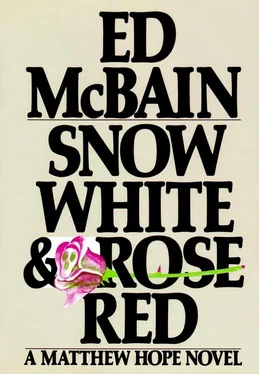Pearson sighed and looked across the desk at me.
“You do her a great disservice by supporting the delusion that she is sane, Mr. Hope. She has incorporated you into that system, and you have become a willing dupe — the White Knight. But the support you are giving her only strengthens the delusion. You are helping her to destroy herself.”
It was not until Monday, April 22, that Bloom and Rawles finally got their first real lead in the Jane Doe case. The trouble was that there were too many damn restaurants and fast-food joints in the downtown area near Albert Barish’s dry-cleaning establishment; a city that doubles as a winter resort had better have a lot of restaurants, or the people will go somewhere else for their fun and frolic. They had talked to Albert Barish on Tuesday, April 16, and had begun looking for the supposed waitress in the brown uniform the very next day. By Saturday they had come up with nothing. Since most restaurants in Calusa were closed on Sunday, they took the day off — even God rested at the end of the week. On Monday morning they hit pay dirt.
There were still a half-dozen restaurants they hadn’t yet hit, all of them catering either to kids who wanted to eat fast and run, or to older people who couldn’t afford fancier food and who lingered over a meal as if it were their last one on earth. The first of these was a Mexican joint, and the waitresses there were wearing black skirts, white peasant blouses, and sandals. One of the waitresses had a rose pinned to her coal-black hair. None of the waitresses wore name tags. The second place was a hamburger joint, and the girls behind the counter were wearing yellow uniforms and barking orders into microphones. The detectives got lucky in the third place, a pizza joint. The girls dishing out hot pizzas were all wearing brown uniforms. A little black plastic tag with a name stamped on it in white was fastened over the left breast of each uniform. The pizza smelled good. Bloom’s mouth began watering — but it was only ten-thirty in the morning.
The manager was dressed in brown, too, just like the girls behind the counter. His name tag read BUD, and beneath that MANAGER. He was eating a slice of pizza when he came out of the kitchen to where Bloom and Rawles were waiting for him. He was perhaps twenty years old, a thin, lanky kid growing a sparse mustache. In Florida, and maybe everywhere in the United States, all the fast-food joints are run by kids. You never see an employee over the age of twenty in a fast-food joint. Kids take the orders, kids wipe off the tables, kids do the cooking, kids do the supervising. If the kids of America ever decided to go on strike, half the population would starve to death.
“Can I help you?” Bud asked. He had finished the pizza and was now licking his fingers.
“Police,” Rawles said, and flashed his badge. “Anyplace we can sit down and talk?”
“Sure, plenty of empty tables,” Bud said. He gestured toward a table near the window. “Any trouble here, officers?”
“No, we just wondered if you could help us with something,” Bloom said.
“Sure, happy to be of assistance,” Bud said.
They went over to the table and sat. They had no pictures to show Bud. They had no names they could throw at him. They had only Barish’s vague description of the two girls who had come to his shop on foot — and the red dress one of them had been wearing when she died. Rawles took the dress out of the evidence envelope.
“Ever see this dress before?” he asked.
Bud looked at it.
“No, Officer, I have not,” Bud said. He looked suddenly nervous.
“Anybody wearing this dress ever come in here?” Bloom said.
“No, sir, not as I can recall.”
“Blonde girl, nineteen, twenty years old.”
“Well, sir, we get a lot of young people in here,” Bud said.
“This girl might have been friendly with one of your employees,” Bloom said.
Bud actually blanched. He did not yet know that the police were here to inquire into a homicide, but he had just been informed that one of his employees might be involved in whatever this was.
“Yes, sir,” he said. “Which employee would that be, sir?”
“Girl with a good build,” Bloom said.
“Big tits,” Rawles said, less delicately.
“Well, we have lots of good-looking girls here,” Bud said. “Would you happen to know her name, officers? Because that would be of great assistance in locating the specific girl you have in mind.”
“No, we don’t have her name,” Rawles said.
“But she would have been friendly with the blonde girl who wore this dress,” Bloom said.
“Is this dress important in some way, officers?” Bud asked. “Has there been a crime committed in which this dress—?”
“Ink spot on it right here,” Rawles said. “See the ink spot?”
“I’m sorry, sir, I don’t recall such a spot,” Bud said.
“Want to round up all the girls so we can talk to them?” Bloom said.
“Sir?”
“Bring them all in the kitchen,” Rawles said. “We want to talk to them privately.”
“Well, officers, we have pizzas to sell here,” Bud said.
“Won’t take a minute,” Bloom said.
“Bring them in the kitchen,” Rawles said.
“Sir, only employees are allowed in the kitchen. That’s a Board of Health regulation, officers. I’m sorry, but—”
“Then bring ’em out here,” Rawles said impatiently.
“Sir, that wouldn’t look right, my girls talking to police officers. Customers might think there was something wrong here.”
“Then let’s go in the goddamn kitchen ,” Rawles said.
“I already told you, sir—”
“We’ll square it with the Board of Health,” Bloom said.
“Let’s get this fucking show moving ,” Rawles said.
“Yes, sir,” Bud said. “I’ll ask the girls to come back, sir.”
The kitchen was hot. Three seventeen-year-old kids kept opening and closing the doors on the big ovens, peering in at the pizzas, moving them around on long wooden paddles, taking them out to place them either in white cardboard boxes or on metal platters, depending on whether the pizza was to be taken home or eaten here. A half-dozen girls filed into the kitchen, puzzled looks on their faces. None of them looked older than eighteen. Rawles immediately discounted two of them as titless wonders. The other four seemed substantially endowed. Bloom reflected later that this was the first time he’d run a lineup predicated on the size of a girl’s brassiere. Rawles sent the two luckless girls back outside to the counter. The name tags on the other four identified them as Margie, Peg, Corrie, and Mary Lou.
“Just relax, girls,” Bloom said, “nothing to worry about here.”
Once again, Rawles took the red dress out of the evidence envelope.
“Anybody recognize this dress?” he asked.
Bloom was watching the girls. One of the four widened her eyes in surprise.
“Anybody?” Rawles said.
“How about you, miss?” Bloom said.
The girl looked even more surprised. “Me?” she said, and one hand came up unconsciously to touch the plastic name tag pinned to her chest. The tag read CORRIE. The chest was as Barish had described it.
“The rest of you can go back to work,” Bloom said. “We want to talk to Corrie alone.”
“Me? What’d I do?” the girl said. Her voice was high and twangy, tinged with a faint southern accent.
“Nothing, miss,” Bloom said. “We just want to talk to you privately.”
Rawles, who hadn’t seen the girl’s expression when he’d held up the dress, knew that Bloom was onto something; he went along with it. “Let’s go, girls,” he said, “back to work now, no problems here, let’s all get back to work.”
Читать дальше












